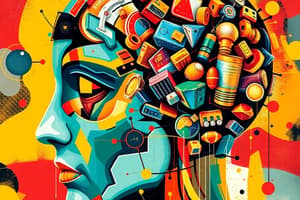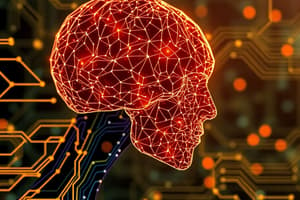Podcast
Questions and Answers
Which of the following best describes Artificial Intelligence (AI)?
Which of the following best describes Artificial Intelligence (AI)?
- A software designed to replace human workers in various industries.
- The capability of machines to perform tasks that typically require human intelligence. (correct)
- A set of algorithms designed to manipulate social media content.
- A system used for automating physical tasks through robotics.
Machine Learning (ML) relies solely on pre-defined rules to enable AI systems to improve their performance.
Machine Learning (ML) relies solely on pre-defined rules to enable AI systems to improve their performance.
False (B)
In the context of procurement, how can Machine Learning be utilized to identify unusual activities?
In the context of procurement, how can Machine Learning be utilized to identify unusual activities?
ML can analyze past data to detect anomalies, such as sudden changes in bid timing or supplier profiles.
Deep Learning is best suited for identifying ______ patterns in large datasets by analyzing multiple layers of information.
Deep Learning is best suited for identifying ______ patterns in large datasets by analyzing multiple layers of information.
Match the following AI capabilities with their appropriate descriptions:
Match the following AI capabilities with their appropriate descriptions:
Which of the following advantages does AI offer in processing government data?
Which of the following advantages does AI offer in processing government data?
AI's primary role in reviewing procurement data is to directly accuse individuals of wrongdoing.
AI's primary role in reviewing procurement data is to directly accuse individuals of wrongdoing.
What is one key advantage of AI when handling large datasets?
What is one key advantage of AI when handling large datasets?
While AI is adept at data analysis, humans are needed to ______ context and make final decisions based on the AI's findings.
While AI is adept at data analysis, humans are needed to ______ context and make final decisions based on the AI's findings.
Which of the following represents a limitation of AI?
Which of the following represents a limitation of AI?
According to the principles for responsible AI use in public service, what does 'Transparency' refer to?
According to the principles for responsible AI use in public service, what does 'Transparency' refer to?
Using AI responsibly in public service means allowing it to make all decisions to avoid human bias.
Using AI responsibly in public service means allowing it to make all decisions to avoid human bias.
In what way does fairness relate to the responsible application of AI?
In what way does fairness relate to the responsible application of AI?
When using AI with data, respecting laws such as ______, is an important aspect of data privacy.
When using AI with data, respecting laws such as ______, is an important aspect of data privacy.
What is the best approach to using AI within the public service environment?
What is the best approach to using AI within the public service environment?
Deep Learning is less detailed than basic Machine Learning.
Deep Learning is less detailed than basic Machine Learning.
What is one specific government process that might benefit from deep pattern recognition capabilities?
What is one specific government process that might benefit from deep pattern recognition capabilities?
What is the benefit of AI's ability to apply consistency to data analysis?
What is the benefit of AI's ability to apply consistency to data analysis?
AI should be treated like a ______: it brings speed and memory, but human collaboration brings wisdom and lived experience.
AI should be treated like a ______: it brings speed and memory, but human collaboration brings wisdom and lived experience.
Match the following benefits to the descriptions
Match the following benefits to the descriptions
Flashcards
What is Artificial Intelligence (AI)?
What is Artificial Intelligence (AI)?
The ability of computers to perform tasks that typically require human intelligence.
What is Machine Learning (ML)?
What is Machine Learning (ML)?
AI gets smarter by learning from examples, rather than just rules.
What is Deep Learning?
What is Deep Learning?
A more advanced form of Machine Learning; great at spotting complex patterns in big data.
How does AI help spot what matters?
How does AI help spot what matters?
Signup and view all the flashcards
What is the primary role of AI?
What is the primary role of AI?
Signup and view all the flashcards
What is a limitation of AI?
What is a limitation of AI?
Signup and view all the flashcards
What is Transparency in AI?
What is Transparency in AI?
Signup and view all the flashcards
What is Fairness in AI?
What is Fairness in AI?
Signup and view all the flashcards
What is Accountability in AI?
What is Accountability in AI?
Signup and view all the flashcards
What is Privacy in AI?
What is Privacy in AI?
Signup and view all the flashcards
What is the best way to use AI in public service?
What is the best way to use AI in public service?
Signup and view all the flashcards
Study Notes
- This module will enable participants to understand AI, distinguish between Machine Learning and Deep Learning, recognize AI's support for public sector compliance, identify AI's strengths and limitations, and apply AI responsibly.
What is Artificial Intelligence (AI)?
- AI is when computers perform tasks needing human thought, such as pattern recognition, making suggestions, or flagging unusual activities.
- AI assists by analyzing data, pinpointing anomalies, and streamlining focus, like finding the fastest route or suggesting movies.
Basic AI Concepts: Machine Learning
- Machine Learning (ML) enhances AI by learning from examples, without strict rules.
- ML uses labeled examples to identify patterns, such as vehicles, without needing a manual.
- In procurement, ML identifies unusual activities (like bid timing changes or supplier profiles) from past data.
Basic AI Concepts: Deep Learning
- Deep Learning is an advanced form of ML which spots complex patterns in big data by analyzing different layers of information.
- Deep Learning can detect subtle connections and learns over time without needing step-by-step instructions.
How AI Helps Spot What Matters
- AI filters large amounts of government data like supplier info, bids, contracts, and payments, highlighting areas for review.
- AI tools can flag unusual bidding, compare supplier values, and notice timing patterns suggesting deeper review.
- For example, AI noticed a supplier winning multiple bids after a new official joined, prompting closer inspection.
What AI Does Well and Where Human Insight Still Matters
- AI is powerful but most effective when combined with human understanding.
- AI excels at quickly analyzing large datasets, spotting trends and irregularities, and consistently remains unbiased if the data is clean.
- AI also learns and improves over time.
- Humans are needed to interpret context, address biases, avoid over-reliance on automated results, and ensure ethical use.
Using AI Responsibly and Fairly
- AI can be a "force for good" if used with clear values.
- Principles for responsible AI use in public service include:
- Transparency: Understanding how AI suggests.
- Fairness: Avoiding reinforcement of past inequalities.
- Accountability: Keeping people involved in final decisions.
- Privacy: Respecting laws like POPIA when working with data.
- AI brings speed and memory, but humans bring wisdom and lived knowledge.
- AI should be used as a support tool, while humans make the final decisions.
Studying That Suits You
Use AI to generate personalized quizzes and flashcards to suit your learning preferences.




